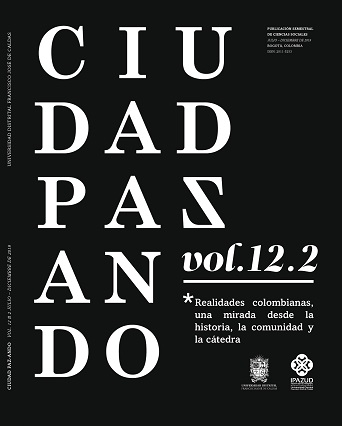DOI:
https://doi.org/10.14483/2422278X.13959Published:
2019-11-23Issue:
Vol. 12 No. 2 (2019): julio-diciembre. Realidades colombianas, una mirada desde la historia, la comunidad y la cátedraSection:
Dossier centralEnseñanza de las humanidades en la modalidad a distancia: reflexión desde la Universidad Santo Tomás
Teaching humanities through distance learning: A reflection from Santo Tomás University
Ensino de humanidades na modalidade a distância: reflexão da Universidade de Santo Tomás
Keywords:
educação a distância, ensino superior, ensino, humanidades (pt).Keywords:
distance education, higher education, teaching, humanities (en).Keywords:
humanidades, enseñanza, educación a distancia, educación superior. (es).Downloads
Abstract (es)
Este artículo presenta los resultados de una investigación desarrollada en el Área de Humanidades de la VUAD de la USTA[1]. Trata el problema de la enseñanza de las Humanidades, su incidencia en la formación humana y ciudadana, en los estudiantes de la Facultad de Ciencias y Tecnologías. La investigación se desarrolla en dos momentos. El primero de carácter teórico, a través del Seminario Alemán. Y, el segundo metodológico, en el cual se presentan el diseño de la muestra, la encuesta y los criterios para su aplicación y análisis de resultados. Finalmente, en las conclusiones se destaca una valoración favorable en la concepción de los estudiantes sobre el aporte de este tipo de asignaturas en su formación personal y profesional.
[1] Vicerrectoría de Universidad Abierta y a Distancia, de la Universidad Santo Tomás.
Abstract (en)
This article presents the research results of a humanities study from the Vice Chancellor’s Office at Santo Tomás University’s Open and Distance University; it explores the challenges associated with teaching humanities and its impact on human and citizen education among students from the School of Sci-ence and Technology. The article is divided into two aspects, namely, a theoretical aspect, including research seminars, and a methodological aspect, presenting the design of the sample, the survey and its application criteria and analysis of results. Finally, the conclusions focus on a positive assessment of the students’ understanding of ways in which humanities contribute to their personal and professional education.
Abstract (pt)
Este artigo apresenta os resultados de uma investigação de-senvolvida na área de humanidades da Vice-reitoria de Uni-versidad Abierta y a Distancia da Universidade Santo Tomás. Trata do problema do ensino das humanidades, sua incidência na formação humana e cidadã, nos estudantes da Faculdade de Ciências e Tecnologias. A investigação é desenvolvida em dois momentos: o primeiro de caráter teórico, através do Seminário Alemão, e o segundo metodológico, no qual é apresentado o desenho da amostra, a pesquisa e os critérios para sua aplicação e análise dos resultados. Por fim, as conclusões destacam uma avaliação favorável na concepção dos estudantes sobre a contribuição deste tipo de disciplinas na sua formação pessoal e profissional.
How to Cite
APA
ACM
ACS
ABNT
Chicago
Harvard
IEEE
MLA
Turabian
Vancouver
Download Citation
License
Copyright (c) 2019 Ciudad Paz-Ando

This work is licensed under a Creative Commons Attribution-NonCommercial-ShareAlike 4.0 International License.
The Ciudad Paz-ando Journal (RCP) is an open access publication, without economic charges for authors or readers, whose biannual publications are made under the terms of the Creative Commons Attribution - Non-commercial - Share the same License (CC-BY-NC -SA 2.5 CO), with which others may distribute, remix, retouch, and create from the work in a non-commercial way, as long as they give credit and license their new creations under the same conditions.
The copyright holder is Ciudad Paz-ando journal, retaining all rights without restrictions, respecting the terms of the license regarding the consultation, download and distribution of the material.
When the work or any of its elements are in the public domain according to the applicable current law, this situation will not be affected by the license.
Likewise, we encourage authors to deposit their contributions in other institutional and thematic repositories, with the certainty that culture and knowledge is a good for all and for all.

